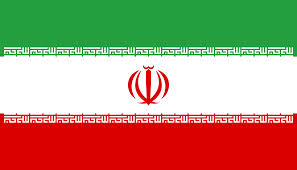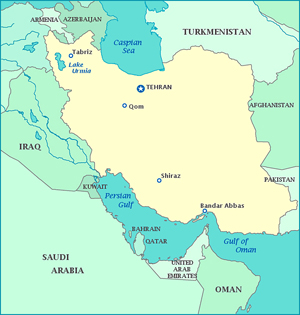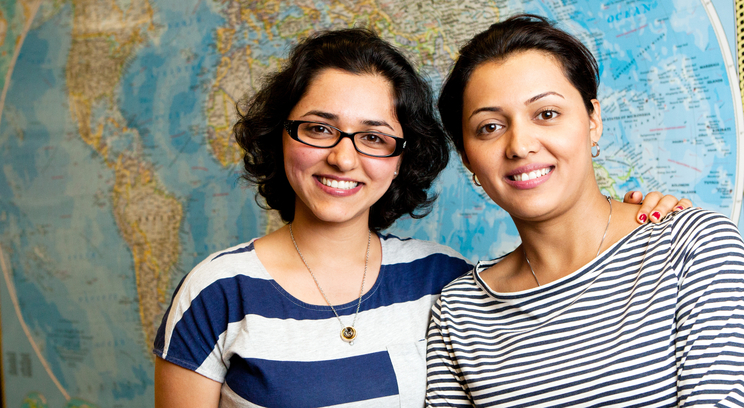CultureLink Tea: Tuesday, Oct. 22
"Minnesota Nice" will meet "Iran Nice" at this month's CultureLink Tea. Negative connotations of the expression aside, Iranians Azadeh and Sepideh Ayani have experienced Minnesota Nice on campus as Graduate Programs in Software students.
The sisters will speak about their homeland, the Islamic Republic of Iran, at this month’s CultureLink Tea – 3:15 p.m. Tuesday, Oct. 22, in Scooter’s.
Azadeh, 31, whose name means “freedom” in Farsi (Persian), the language of Iran, has been in Minnesota about two and a half months. Sepideh, 28, whose name means “dawn” in Farsi, arrived on campus Sept. 3. Her classes started the next day.
The sisters, who seemed as friendly and reserved in a recent interview as any Minnesotan, thought that it would be hard to make connections and new friends here, but they agree that the natives are very friendly and very welcoming. Azadeh first heard the expression Minnesota Nice during an international student orientation session at St. Thomas, but she experienced it even before she arrived in the state – in Europe on a Delta flight bound for Minnesota.

The flag of Iran.
“The person who was sitting behind me said, ‘Hi, I am Peter from Minnesota.’ And I said, ‘Oh, my god, it’s my first Minnesotan.’ And he continued,” Azadeh said. “They laugh. They try to help you whenever you ask a question. When I don’t understand and I say, ‘Could you please speak slower or repeat it,’ they say, ‘Oh, yes.’ They want to help you.”
Sepideh shared a similar Minnesota Nice experience her first day on campus. “There are friendly people here,” she said. “I just arrived the third of September, and the day after I had to start school. The fourth of September was my first class. I had to do the registration process in one day, but I did it. They all were fast and really friendly.”
At the CultureLink Tea, the sisters plan to dispel the various stereotypes that Americans have of Iranians, and show the campus community that Minnesotans would receive equally kind treatment in Iran as the sisters have found in Minnesota.
“Here in the United States the information about Iran is very influenced by the media, and we are going to do our best to present a better picture of Iran for Americans,” Azadeh said. “Unfortunately, I think there is not a real picture of Iran and the Iranian people and our culture. So we are going to do our best to give the real picture of Iran.”
One thing they want to set straight is that Americans who travel to Iran will not be harmed. “It’s not like that,” Sepideh said. “The people in Iran are really, really friendly to Americans. … The people just want to talk to you in the street. The people are so friendly. They say, ‘Hi, how are you?’ We want to show that Iranians are not as some Americans think they are.”
They also plan to talk about Tehran, the capital of Iran and their hometown, other famous cities in the country, and also about the misconception of Iran’s climate. Iran is a Middle Eastern country in southwestern Asia, but it does not fit the stereotypical, desertlike image of the Middle Eastern climate. Iran has four seasons like Minnesota – and snow.

The Islamic Republic of Iran is located in southwestern Asia.
“Some of my friends at Scooter’s have asked me: ‘Do you have snow? Have you ever seen snow?’” Sepideh remarked. “I said, ‘Guys, we have snow. We have skiing. My friends are skiers.’ We want to show these things. We have everything, but we have to show them. … We have sports. We have everything that you can imagine.”
“We’ve heard that winter here is more severe,” she added.
Iranians have stereotypical images of Americans as well, believing that all Americans are overweight and that American parents don’t care about their children. Neither is true, they agreed.
They also plan to talk about politics. “We are going to talk about our new government and our new president, of which all Iranians are very happy with that. We came, you know, because he is going to make some changes,” Azadeh said.
The sisters cited a positive development in American-Iranian relations – the late-September telephone call President Barak Obama made to Hassan Rouhani, Iran’s new president. The call is believed to be the first direct exchange between U.S. and Iranian leaders in more than 30 years. “Most Iranians are very happy with this event,” Sepideh said.
“As long as we respect each other rather than the nationality, we are really open-minded to being friends with all people. For us, I think it’s important that our government make a good relationship with the American government. And because of that we are happier. My family is happier. Some families, no. They are not happy. … But they are a small group,” Sepideh said. She notes that she has a new friend here from Israel.
“The majority of people, they want America and Iran to have a good relationship,” Azadeh added.
Both Azadeh and Sepideh have undergraduate degrees in public management from Azad University in Tehran. Azadeh is two semesters from completing an online program in information technology management at Ferdowsi University in Mashhad, Iran. Sepideh has a master’s degree in public administration from the University of Malaya in Kuala Lumpur, Malaysia.
Both are in their first semester at St. Thomas. Azadeh plans to follow the information technology track while Sepideh plans to study software management.
The sisters are staying with an aunt and uncle who live in Mendota Heights, and they have a cousin, Parastoo Fatehi, who is a graduate student at St. Thomas.
* * *
CultureLink Teas are sponsored by International Student Services. Next month's tea will be held at 3:15 p.m. Tuesday, Nov. 12, in Scooter’s – earlier in the month than usual to coincide with International Education Week. Two American students who studied abroad in Japan and two students from Japan will give presentations.







